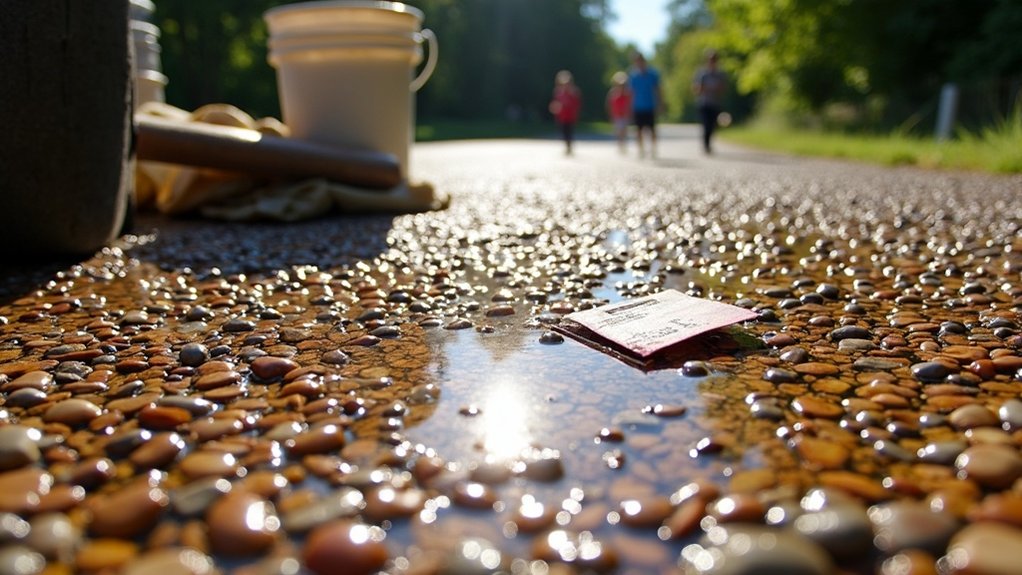Resin-bound gravel driveway repairs cost £80 to £7,900 in the UK, with the final price varying by job size and complexity. Small crack repairs start at £80, whilst major restoration work can reach several thousand pounds. Common repairs include:
- Crack filling: £80-£550
- Full reseal: £220-£565
- Patch repairs: £150-£400
The price depends heavily on your driveway’s condition, size and accessibility. A typical semi-detached house driveway measuring 50m² might need £300-£400 for basic repairs, whilst a large 200m² surface could cost upwards of £1,000 for the same work.
Regular maintenance keeps costs down – sweep regularly and clean spills promptly to prevent damage. Consider an annual professional clean (£150-£300) to protect your investment and avoid costly repairs later.
Key Takeaways
Resin-bound Gravel Driveway Repair Costs
A full repair on a typical 54m² resin-bound driveway sets you back £5,100-£7,900, with costs varying based on damage extent and complexity.
Basic repairs:
- Crack repairs: £80-£550
- Loose stone patches: £125-£485
- Regular cleaning: £80-£160
- Resealing: £220-£565
Ground preparation is crucial – expect around £4,000 for a double driveway, but it’s worth the investment to prevent costly future repairs. Think of it like building a house – skimp on the foundations, and you’ll pay more later.
The quality of materials makes a real difference. Premium resins and aggregates might cost more upfront but typically need fewer repairs over time. It’s similar to buying quality shoes – spend more now, save on repairs later.
These prices are typical for UK contractors, though rates may vary by region.
Understanding Repair Costs for Resin-Bound Gravel Driveways
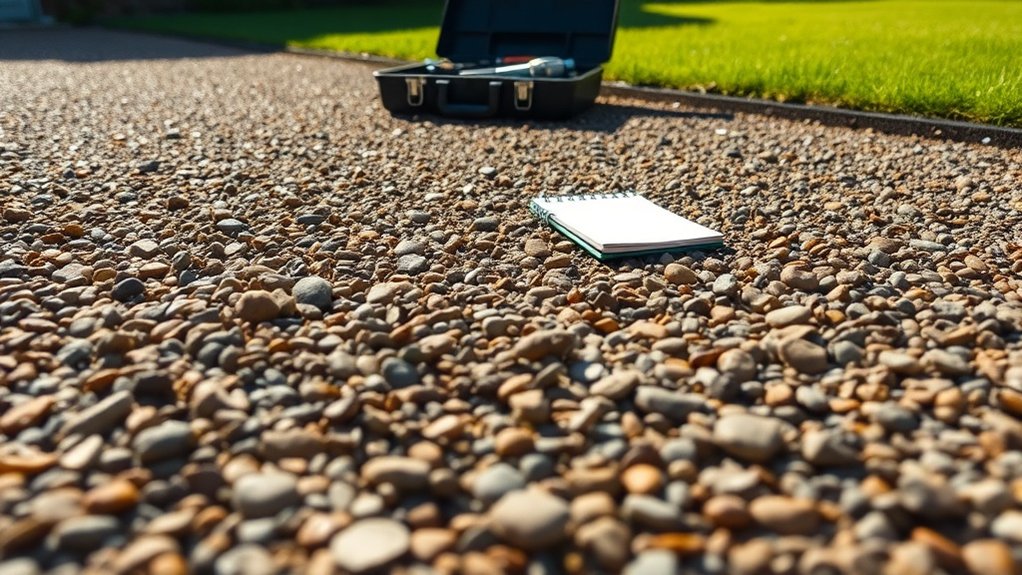
Understanding repair costs for resin-bound gravel driveways needn’t be complicated. The main factors affecting your costs include:
- Driveway size: A typical UK double driveway (roughly 50m²) will cost more to repair than a single car space.
- Layout complexity: Curved edges and intricate patterns take longer to fix, pushing up labour costs.
- Resin quality: Premium binders might cost more initially but typically need fewer repairs; (using UV-resistant materials) can also lead to long-term savings.
- Site features: Steep slopes or poor drainage can make repairs trickier and pricier.
- Weather impact: British weather can be harsh on driveways – areas with heavy rainfall may need more frequent maintenance. Investing in quality materials from the start often proves cheaper than dealing with repeated repairs, as average resin driveway costs indicate that choosing higher quality aggregates could reduce long-term expenses. For example, using UV-stable resin in sun-exposed areas prevents yellowing and cracking, saving money on future fixes.
Keeping on top of small repairs, like filling minor cracks before winter sets in, helps avoid more expensive problems later. Regular inspections for weed removal can further prevent costly repairs down the line.
Common Types of Repairs and Their Price Ranges
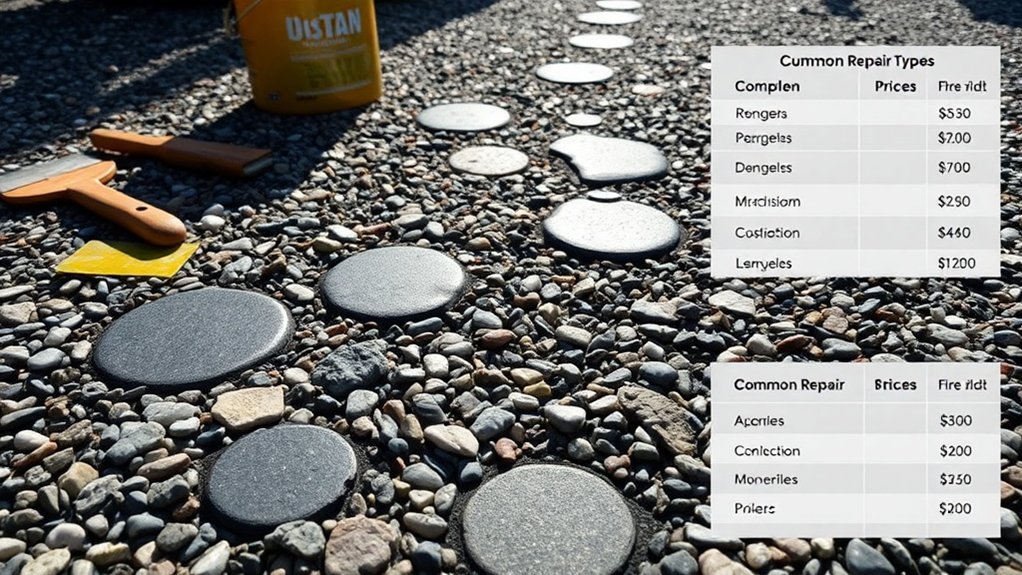
Common repairs for resin-bound driveways vary in cost across the UK.
Crack repairs typically cost £80-£550, with price depending on damage severity. Repair costs range from $0.50 to $2.20 per square foot for re-grading, resurfacing, or regraveling, which is also an important consideration for any driveway maintenance. Regular inspections help maintain the integrity of repairs and detect issues early, ensuring long-lasting results.
Loose stone repairs range from £125-£485, whilst regular cleaning comes in at £80-£160.
Rust removal is relatively affordable at £60-£240. Proper maintenance, such as pressure washing after heavy rain, can prevent more costly repairs.
A full reseal costs between £220-£565 – essential for protecting your investment.
More serious structural repairs can set you back £200-£800, varying by complexity and materials needed. Seeking professional help may be necessary for underlying macadam damage, which indicates more severe issues that require expert assessment.
Tip: Local contractors often offer better rates than national firms, and many provide free quotes.
Get multiple estimates before committing to major repairs.
Factors Affecting Repair Expenses
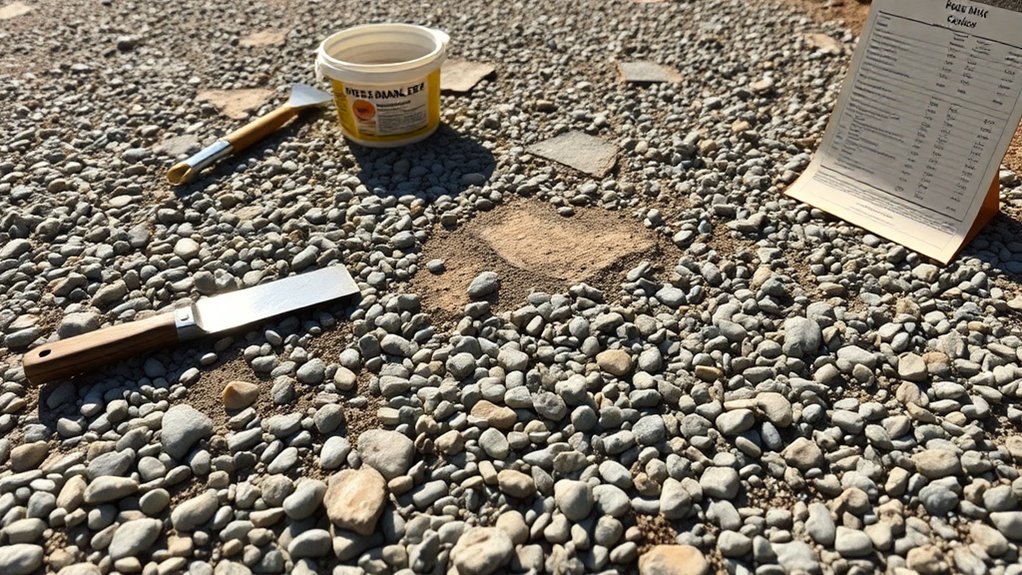
The cost of repairing your resin-bound gravel driveway hinges mainly on its size and the quality of materials used. A larger driveway, say 100 square metres versus 50, will need more materials and labour time, naturally costing more. Additionally, the condition of the existing driveway surface plays a crucial role in preparation needs, which can further influence repair expenses. Your choice of resin and stone aggregate matters too – premium UV-stable resins and high-grade aggregates cost more upfront but tend to last longer than basic alternatives. Proper site preparation is key to ensuring the longevity of the repairs. These elements directly affect both immediate repair costs and long-term maintenance needs. Worth noting that prices vary significantly across UK regions, with London and the South East typically charging higher rates.
Driveway Size Impact
The size of your driveway significantly affects repair costs, from materials to labour needs.
Larger driveways require more resin and aggregate, which drives up material expenses considerably. As a reference, fixing a 54-square-metre driveway typically costs between £5,100 and £7,900.
Bigger areas need more time for mixing and spreading resin, whilst complex shapes demand skilled workmanship, adding to the overall cost.
Site prep is crucial – larger driveways often require thorough grading and proper drainage solutions.
The driveway’s dimensions and layout determine which repair methods work best, impacting both current and future maintenance costs.
Material Quality Considerations
Quality materials make a massive difference to your resin-bound driveway’s durability and repair costs. The key is choosing a proper UV-stable resin – cheaper options tend to yellow and crack, whilst premium resins last much longer.
Think of it like choosing between budget and quality paint for your house exterior.
For stones, there’s a simple trade-off: finer aggregates look smoother but damage more easily, whilst chunkier stones are tougher but cost more upfront.
Getting the mix right between resin and stone is crucial – it’s like baking, where the wrong proportions lead to poor results.
Don’t skimp on installation materials or ground preparation. Whilst it might seem costly initially, it’s far cheaper than fixing a poorly laid driveway later.
Remember: quality materials paired with proper installation will save you money on repairs down the line.
Maintenance Tips to Reduce Future Repair Costs
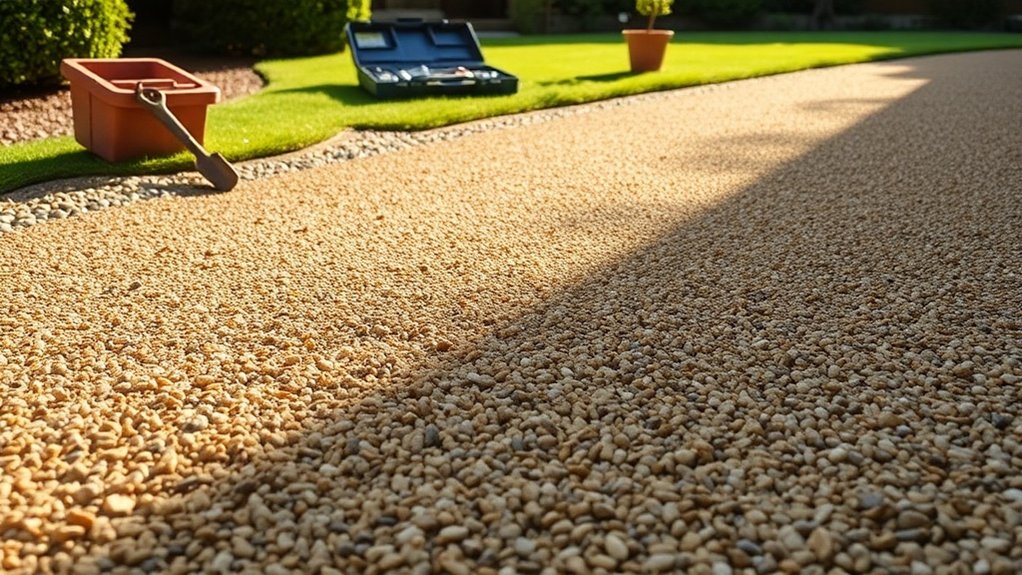
Keep your resin-bound driveway in top condition whilst minimising repair costs with regular sweeping to prevent dirt build-up.
Give it a good power wash once a year to shift stubborn grime and algae – think of it like giving your car a proper clean.
Most importantly, reseal the surface every 2-4 years, much like treating a wooden fence, to protect against British weather and extend its life.
Regular Sweeping Schedule
Regular Sweeping for Resin-Bound Driveways
A proper sweeping routine keeps your resin-bound driveway in top condition.
Regular maintenance offers key benefits:
- Prevents staining from fallen leaves and soil
- Stops moss and algae taking hold
- Maintains proper drainage to avoid puddles and frost damage
Weekly or fortnightly sweeping is ideal, depending on surrounding trees and weather conditions.
Use a stiff brush for best results – it’ll shift debris without damaging the resin surface.
Regular upkeep means fewer expensive repairs and a driveway that stays smart for years.
Annual Power Washing
Regular power washing is essential for keeping your resin-bound driveway in top condition. Once a year is the minimum, though if you live in a particularly wet region or somewhere with lots of fallen leaves, you might need three to four cleans annually.
Set your pressure washer between 1,200 to 1,500 psi and use wide-angle nozzles to avoid damaging the surface. Before starting, sweep away any loose debris and check there’s no frost on the ground.
A gentle cleaning solution can shift stubborn marks like oil spots or algae without harming the resin.
Sticking to this cleaning routine will keep your driveway looking smart and help you avoid costly repairs down the line.
Timely Re-Sealing Practices
Re-Sealing Your Resin Drive
Regular re-sealing of your resin-bound driveway ensures it stays smart and sturdy whilst keeping costly repairs at bay.
Essential maintenance points:
- Re-seal timing: Every 2-5 years. High-traffic drives or those in direct sunlight need more frequent attention.
- Sun protection: Choose UV-resistant sealers to prevent fading and protect your drive’s colour.
- Basic care: Check for damage monthly and remove weeds straight away to maintain surface quality.
Pro tip: Book re-sealing during dry spring or summer months for best results.
The Impact of Material Quality on Repair Longevity
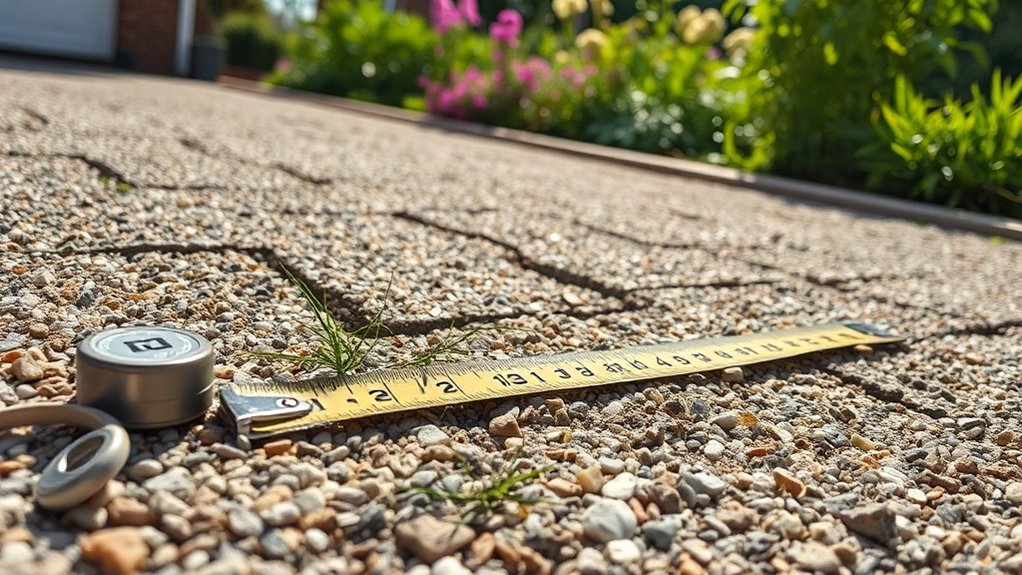
Quality materials make a massive difference to how long your resin-bound gravel driveway lasts.
Top-grade polyurethane resins with UV protection won’t yellow or become brittle, lasting 20-25 years. Cheaper resins, however, quickly break down in sunlight, causing unsightly cracks and fading.
Clean, properly-graded aggregates create stronger bonds and better wear resistance. Getting the resin-to-aggregate mix spot-on ensures your driveway stays flexible and well-bonded.
Whilst premium materials cost more initially, they’ll save you money by needing fewer repairs and less maintenance over time.
Think of it like buying cheap vs quality trainers – the better ones might cost more upfront, but they’ll serve you far longer and perform better throughout their life.
The difference in durability between high and low-quality materials is remarkable, making quality materials a worthwhile investment for your driveway.
Labor and Preparation Costs in Driveway Repairs
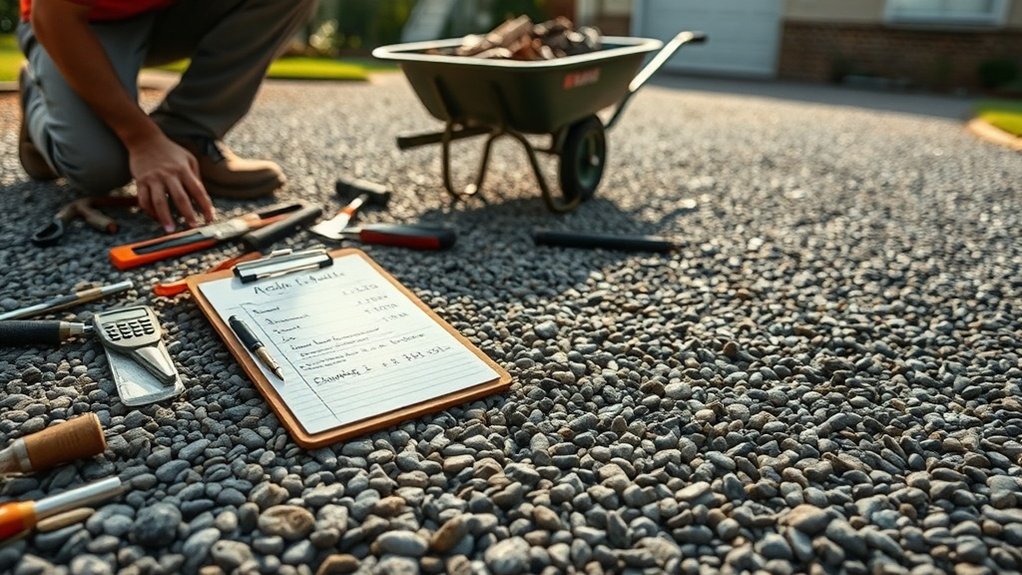
Labour and Preparation Costs for Driveway Repairs
Getting your resin-bound gravel driveway fixed isn’t just about the materials – you need to factor in labour and prep work too.
A clear breakdown of costs:
- Labour Costs: Expect to pay £1 to £1.20 per square foot for sealing work from qualified tradespeople.
- Ground Preparation: Essential groundwork prevents problems later but costs roughly £4,000 for a typical double driveway.
- Extras: Jet washing usually adds £80-£150 to your bill, but it’s vital for proper repairs.
These costs might seem steep, but skimping on preparation often leads to costly repairs down the line.
Think of it like decorating – proper prep work makes all the difference to the final result.
Frequently Asked Questions
How Can I Identify Signs of Damage in My Driveway?
Check your driveway for cracks, patchy discolouration, and loose gravel or stones. Pay attention to dips or raised sections where the surface isn’t level. If you spot water collecting in certain areas or notice soft, spongy patches whilst walking, these are clear signs your driveway needs attention. Regular checks help prevent costly repairs down the line.
Is DIY Repair Feasible for Resin-Bound Gravel Driveways?
Minor repairs to resin-bound gravel driveways are perfectly manageable as a DIY job, provided you’ve got proper tools and know-how. For small cracks or loose spots, a DIY approach works well – much like fixing a small hole in your garden path. However, significant damage, such as large cracks or surface delamination, needs professional attention to avoid botched repairs that’ll cost more to fix later.
What Warranty Options Are Available for Driveway Repairs?
Driveway repair warranties in the UK typically come in two forms: manufacturer guarantees and contractor workmanship warranties. Coverage periods generally span from 12 months to 10 years, with most reputable firms offering at least a 5-year warranty. Mind the terms and conditions carefully, as British weather can affect warranty validity, particularly with concrete and tarmac repairs.
How Long Do Repairs Typically Last Before Needing Attention?
Repairs typically last upwards of 10 years when properly maintained. Regular checks and prompt fixes extend their lifespan considerably. For driveways specifically, resealing every 3-5 years maintains appearance and durability whilst protecting your investment.
Are There Eco-Friendly Options for Driveway Repairs?
Eco-friendly driveway repairs offer several sustainable options for UK homeowners. Recycled materials, such as crushed concrete and reclaimed brick, provide durable solutions whilst reducing landfill waste. Permeable surfaces, including gravel and reinforced grass grids, help manage rainwater naturally and prevent flooding. Water-based sealants and plant-based resins serve as effective alternatives to traditional petroleum products. These green choices maintain your driveway’s integrity whilst lessening environmental impact.
Conclusion
A resin-bound gravel driveway adds value and kerb appeal to your property. Like any surface, it can develop wear and damage over time. Regular maintenance helps prevent costly repairs, whilst proper installation using quality materials ensures long-term durability. With proper care and timely repairs, your driveway will remain sturdy and attractive throughout the seasons.
